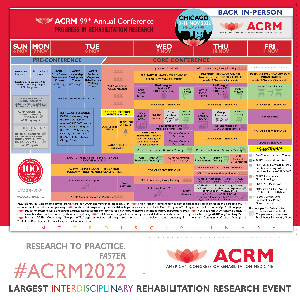Back
Complementary Integrative Rehabilitation Medicine
SHORT-TIME EFFECTS OF SPA-REHABILITATIVE INTERVENTIONS ON PAIN, MOOD AND QUALITY OF LIFE IN MUSCULOSKELETAL DISORDERS
Wednesday, November 9, 2022
3:24 PM – 3:29 PM
Location: Station 6
- MM
Maria Chiara Maccarone, n/a
Resident
University of Padua, Italy - SM
Stefano Masiero
Professor and Chair Physical Medicine and Rehabilitation, Medical Director.
University of Padua, United States
Presenting Author(s)
Research Objectives: To investigate the short-term effects of a spa rehabilitative protocol on pain perception, mood, and Quality of Life among patients affected by degenerative musculoskeletal disorders or post orthopaedic surgery outcomes.
Design: A multicenter observational study was conducted through pre- and post-treatment evaluations, planned follow-ups at three and six months were not conducted because of the COVID-19 pandemic.
Setting: The study was carried out in six spa facilities (Sirmione, Lombardy region, Italy; Abano Terme, Veneto region, Italy; Battaglia Terme, Veneto region, Italy; Levico Terme, Trentino Alto Adige region, Italy; Bibione, Veneto region, Italy; Casciana Terme, Tuscany region, Italy).
Participants: From March 2019 up to October 2019, data from the 160 users of the spa facilities with a medical prescription were collected.
Interventions: Twelve sessions of water-based exercise (thermal or warm water), six sessions per week, for a period of two weeks. A group of 44 patients also received traditional thermal therapies, including 12 mud therapy sessions and 12 thermal baths, six times each week, for two weeks.
Main Outcome Measures: Numerical Rating Scale (NRS), the Short Form Health Survey (SF-12), and the EuroQol-5D (EQ-5D).
Results: Data analysis has highlighted significant improvements in NRSp (p < 0.001), NRSa (p < 0.001), SF-12 PCS (p < 0.001), SF-12 MCS (p < 0.001), EQ-5D (p < 0.001), and NRSm (p=0.005) after the treatments. Different water types seemed to influence results, showing significant differences in NRSp, NRSa, NRSm, SF-12 PCS, SF-12 MCS and EQ-5D scores (p-value respectively, 0.003, < 0.001, < 0.001, < 0.001, < 0.001).
Conclusions: he spa environment in real-life demonstrated it could provide an out-of-hospital alternative for post-surgical patients. The addition of traditional thermal treatments should be a viable strategy for rehabilitation in degenerative conditions.
Author(s) Disclosures: No coflict of interests to declare.
Design: A multicenter observational study was conducted through pre- and post-treatment evaluations, planned follow-ups at three and six months were not conducted because of the COVID-19 pandemic.
Setting: The study was carried out in six spa facilities (Sirmione, Lombardy region, Italy; Abano Terme, Veneto region, Italy; Battaglia Terme, Veneto region, Italy; Levico Terme, Trentino Alto Adige region, Italy; Bibione, Veneto region, Italy; Casciana Terme, Tuscany region, Italy).
Participants: From March 2019 up to October 2019, data from the 160 users of the spa facilities with a medical prescription were collected.
Interventions: Twelve sessions of water-based exercise (thermal or warm water), six sessions per week, for a period of two weeks. A group of 44 patients also received traditional thermal therapies, including 12 mud therapy sessions and 12 thermal baths, six times each week, for two weeks.
Main Outcome Measures: Numerical Rating Scale (NRS), the Short Form Health Survey (SF-12), and the EuroQol-5D (EQ-5D).
Results: Data analysis has highlighted significant improvements in NRSp (p < 0.001), NRSa (p < 0.001), SF-12 PCS (p < 0.001), SF-12 MCS (p < 0.001), EQ-5D (p < 0.001), and NRSm (p=0.005) after the treatments. Different water types seemed to influence results, showing significant differences in NRSp, NRSa, NRSm, SF-12 PCS, SF-12 MCS and EQ-5D scores (p-value respectively, 0.003, < 0.001, < 0.001, < 0.001, < 0.001).
Conclusions: he spa environment in real-life demonstrated it could provide an out-of-hospital alternative for post-surgical patients. The addition of traditional thermal treatments should be a viable strategy for rehabilitation in degenerative conditions.
Author(s) Disclosures: No coflict of interests to declare.
Learning Objectives:
- Upon completion, participant will be able to debate and list the beneficial effects of spa-rehabilitative interventions
- Upon completion, participant will be able to recognise the positive effects on post-surgical orthopaedic disability and the further benefits of the addition of traditional thermal therapies.
- Upon completion, participant will be able to classify the different types of thermal waters and their beneficial effects on different aspects of patients with muscular diseases.

.jpg)
